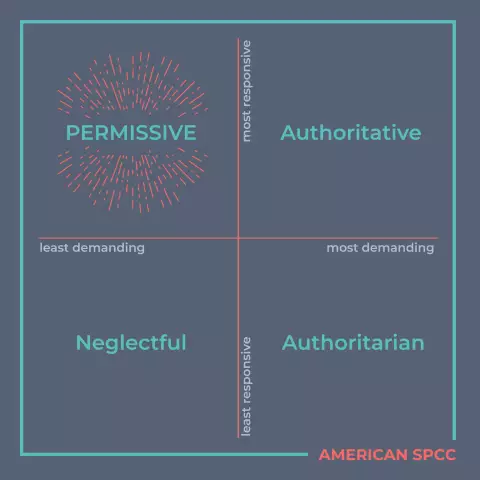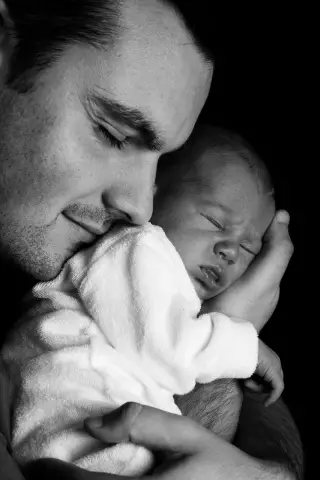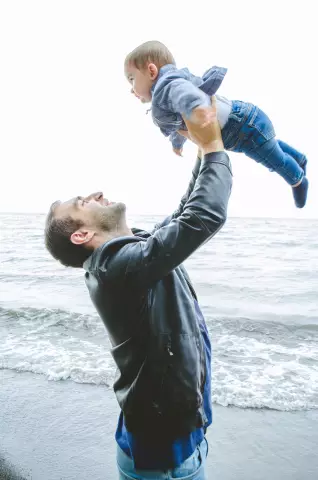- Author Rachel Wainwright wainwright@abchealthonline.com.
- Public 2023-12-15 07:39.
- Last modified 2025-11-02 20:14.
Types of parenting
The active formation of a child's personality in the process of upbringing is formed by the age of 5-7 years, this is a scientifically substantiated fact, confirmed by works in the field of pedagogy and psychology.

Therefore, the formation of the individual largely depends on how versatile the various types of upbringing of preschool children were taken into account in the process for harmonious development.
Personality upbringing is a complex complex of external influences on the formation of individual qualities, value systems, beliefs and attitudes with the use of various types of upbringing of children.
Types of education for preschool children
Professional teachers identify the following priority types of upbringing of children:
- Physical - the development of basic physical qualities such as agility, strength, endurance, speed, flexibility and general strengthening of physical health. Parents are advised to pay special attention to the physical development of the child from the moment of birth, especially since in infancy, physical and mental development are quite strongly interconnected;
- Intellectual (mental) - the development of the child's intellect, imagination, thinking, memory, speech and the ability to self-awareness and consciousness. Interest and curiosity in babies must be supported and encouraged in order to feed their mental development and stimulate the desire for new information and learning;
- Logical (mathematical) - the development of the skills of logical and mathematical thinking. Formation of the child's skills in analysis, synthesis, generalization, classification, abstraction, concretization and comparison of the information received. The kid should be taught to solve problems in various ways and the ability to reasonably explain the course of decisions;
- Speech - the development of children's speech consists of teaching kids the sound, lexical and grammatical speech components. The task of educators is to constantly replenish both the active and passive vocabulary of children. Teach the child to speak correctly, beautifully, expressively intonationally, pronouncing all sounds, teach the ability to express their thoughts in monologues and dialogues. Speech education is closely related to intellectual and logical education;
- Moral (ethical) - development of a system of moral values and qualities in children, instilling social and family moral norms. Teaching a culture of behavior and communication, the formation of a personal life position and attitude towards the country, family, people, nature, work, etc.;
- Labor - teaching the child labor skills, the formation of a conscientious attitude to the work performed, hard work, diligence, conscious participation in labor activities;
- Musical - the formation of musical taste, familiarization with various musical styles and directions, teaching elementary musical concepts such as rhythm, tempo, sound and pitch intonation, dynamics, emotionality of the piece;
- Artistic and aesthetic - the formation of artistic taste, familiarization with various types of art, fostering a sense of beauty in a child, familiarization with aesthetic values, development of personal creative preferences.
All these types of upbringing of children are aimed at the comprehensive development of the personality even in preschool age. Therefore, you should devote enough time and effort to all aspects of the educational process. In the modern world, parents, and often grandparents, are busy at work. In order for the development of kids to be harmonious, some types of upbringing of children are trusted by professional teachers, tutors, preschool institutions, nannies. In such cases, close cooperation of all educators is necessary to create an atmosphere of safety and love in the upbringing process, joint control of the content and quality of processes, competent, coordinated, systematic and consistent conduct of classes, taking into account the age characteristics of the kids.
The task of parents is to responsibly prepare for the appearance of a child, familiarize themselves with the types of parenting and determine the preschool development of their child, so that it is comprehensive and complete at every stage of his growing up.
The Japanese parenting system
The Japanese upbringing of children is of great interest all over the world. Such a system is based on three educational stages:
- Up to 5 years old - "king". The child is allowed everything, the parents only care about the baby and try to please all his desires;
- From 5 to 15 years old - "slave". The norms of social behavior are laid, compliance with all rules is required, the fulfillment of labor duties;
- From 15 years old - "adult". Receiving adult rights in society, after 15 years of age, children are obliged to clearly know and fulfill all responsibilities, obey the rules of the family and society, and honor traditions.
It should be understood that the main task of Japanese pedagogy is to educate a person who knows how to work harmoniously in a team, this is a very important quality for life in Japanese society. But a child brought up on the principle of group consciousness encounters great difficulties in case of need to think independently.

Ordinary Japanese live their whole life in a system of strict rules that prescribe how to act in various life situations, departing from which a person falls out of the system and becomes an outcast. The basis of Japanese morality is that the interests of society are higher than those of the individual. Japanese children learn this from early childhood, and the greatest punishment for them is the so-called "threat of alienation." With such punishment, the child is opposed to any group or is ignored (boycotted) by the family, this is the morally most difficult punishment for Japanese children. That is why, with such a cruel measure in their arsenal, parents never raise their voices at children, do not read lectures, and do not use corporal punishment and restraint of freedom.
These facts should be taken into account by the adherents of the Japanese parenting system in order to understand that, allowing their child to be all up to 5 years old, it will need to be put into a rigid framework after. Such a sharp change in the educational process, which is not based on historical traditions and national mentality, can adversely affect the fragile child's psyche.
Found a mistake in the text? Select it and press Ctrl + Enter.






